中考英语复习词类语法专题---代词
图片预览
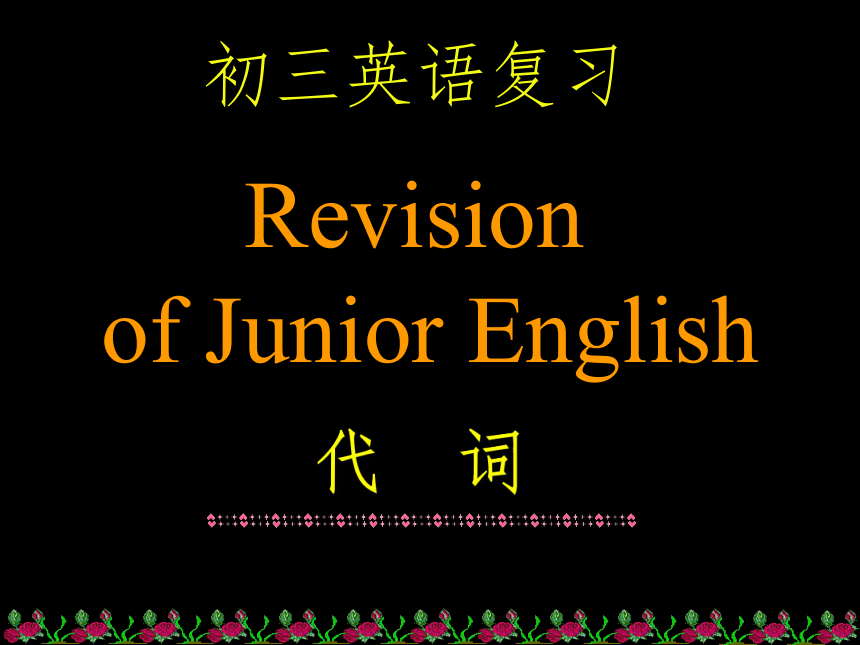
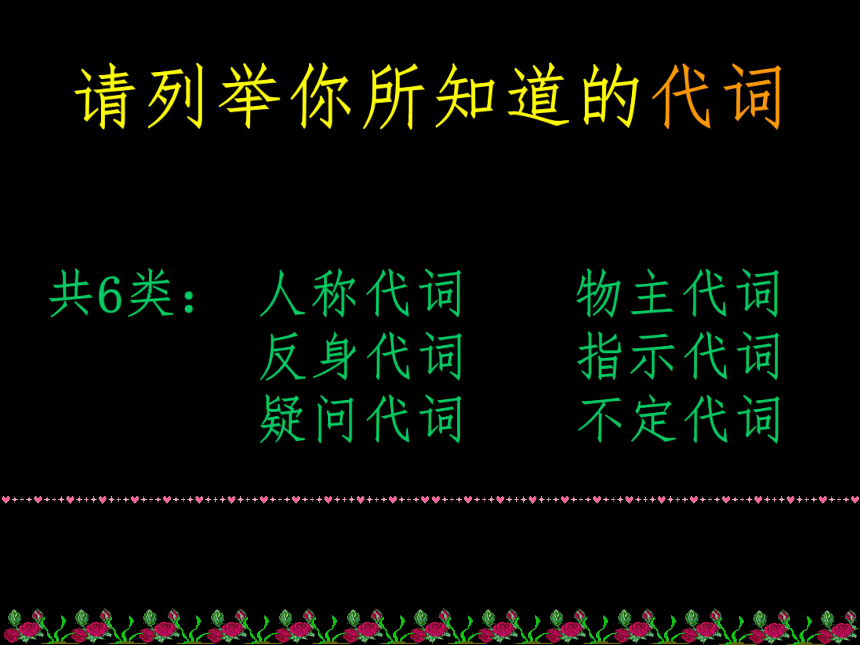

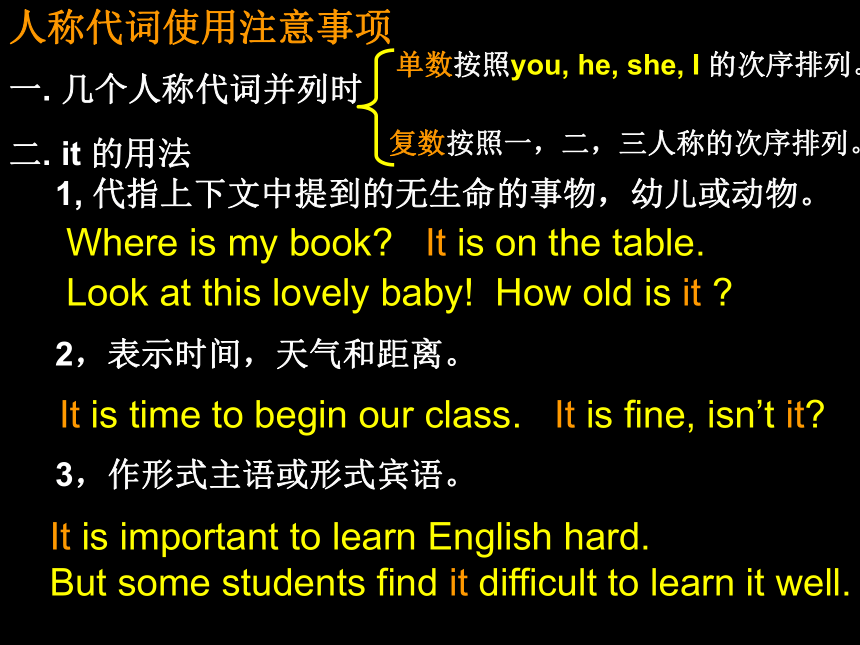
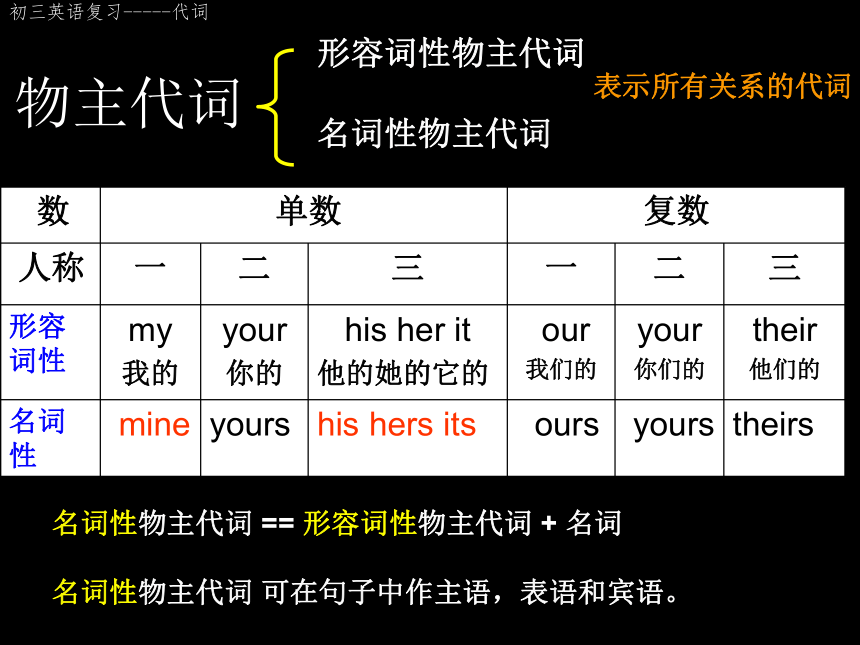
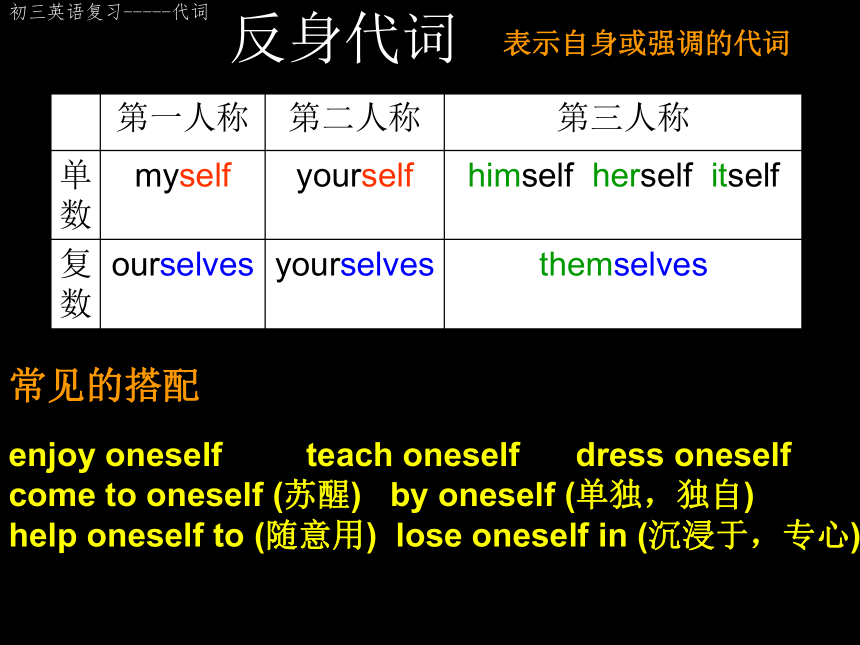
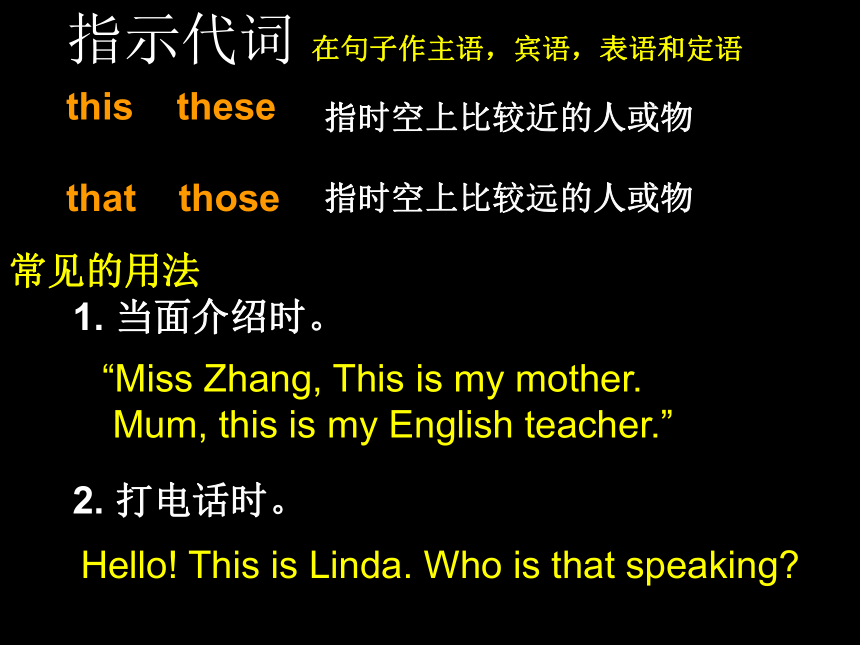
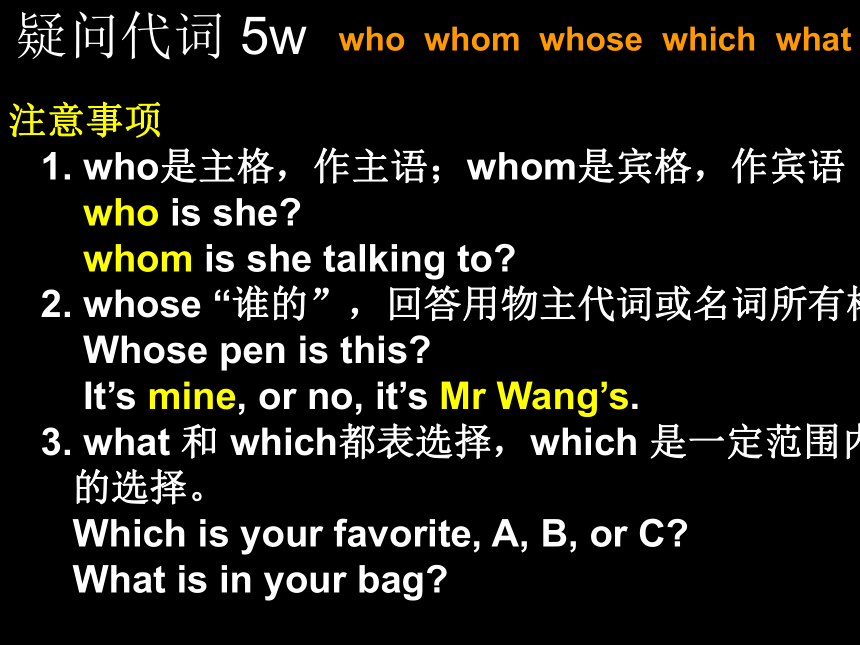
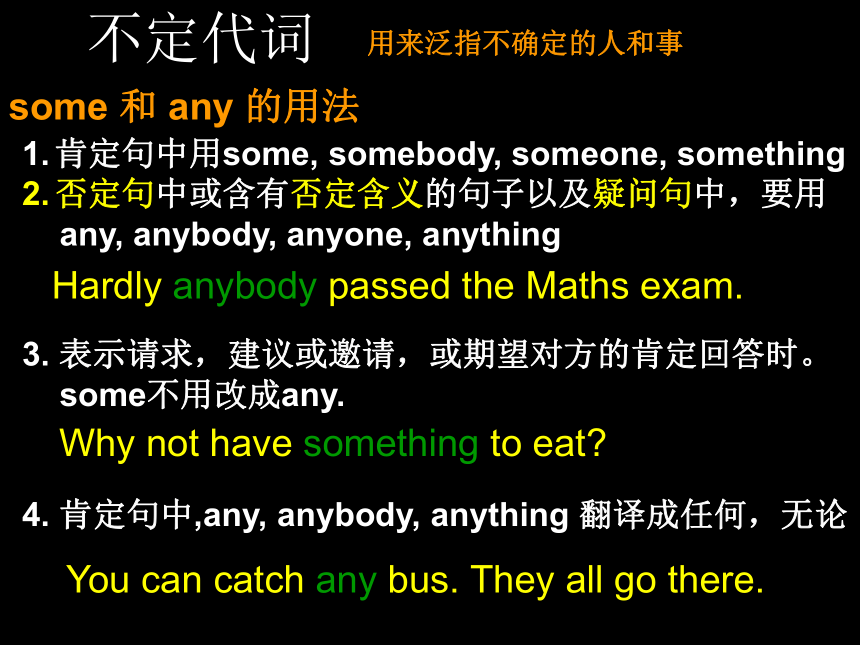
文档简介
(共28张PPT)
初三英语复习
Revision
of Junior English
代 词
请列举你所知道的代词
共6类: 人称代词 物主代词
反身代词 指示代词
疑问代词 不定代词
初三英语复习-----代词
人称代词
主格
宾格
在句子中作主语
在句子中作及物动词或介词的宾语
第一人称 第二人称
第三人称
主格 I we
我 我们 you
你,你们 he she it they
他 她 它 他们
宾格 me us you him her it them
人称代词使用注意事项
一. 几个人称代词并列时
二. it 的用法
1, 代指上下文中提到的无生命的事物,幼儿或动物。
2,表示时间,天气和距离。
3,作形式主语或形式宾语。
Look at this lovely baby! How old is it
It is time to begin our class. It is fine, isn’t it
It is important to learn English hard.
But some students find it difficult to learn it well.
Where is my book It is on the table.
单数按照you, he, she, I 的次序排列。
复数按照一,二,三人称的次序排列。
初三英语复习-----代词
物主代词
形容词性物主代词
名词性物主代词
表示所有关系的代词
数 单数 复数
人称 一 二 三 一 二 三
形容词性 my
我的 your
你的 his her it
他的她的它的 our
我们的 your
你们的 their
他们的
名词性 mine yours his hers its ours yours theirs
名词性物主代词 == 形容词性物主代词 + 名词
名词性物主代词 可在句子中作主语,表语和宾语。
初三英语复习-----代词
反身代词
表示自身或强调的代词
第一人称 第二人称 第三人称
单数 myself yourself himself herself itself
复数 ourselves yourselves themselves
常见的搭配
enjoy oneself teach oneself dress oneself
come to oneself (苏醒) by oneself (单独,独自)
help oneself to (随意用) lose oneself in (沉浸于,专心)
指示代词 在句子作主语,宾语,表语和定语
this these
that those
指时空上比较近的人或物
指时空上比较远的人或物
常见的用法
1. 当面介绍时。
2. 打电话时。
“Miss Zhang, This is my mother.
Mum, this is my English teacher.”
Hello! This is Linda. Who is that speaking
疑问代词 5w
who whom whose which what
注意事项
1. who是主格,作主语;whom是宾格,作宾语
who is she
whom is she talking to
2. whose “谁的”,回答用物主代词或名词所有格
Whose pen is this
It’s mine, or no, it’s Mr Wang’s.
3. what 和 which都表选择,which 是一定范围内
的选择。
Which is your favorite, A, B, or C
What is in your bag
不定代词
用来泛指不确定的人和事
some 和 any 的用法
肯定句中用some, somebody, someone, something
否定句中或含有否定含义的句子以及疑问句中,要用
any, anybody, anyone, anything
3. 表示请求,建议或邀请,或期望对方的肯定回答时。
some不用改成any.
4. 肯定句中,any, anybody, anything 翻译成任何,无论
Hardly anybody passed the Maths exam.
Why not have something to eat
You can catch any bus. They all go there.
5. 在if引导的条件状语从句中,用any, anyone, anything
6. 互相间的转换。
If anyone has any questions to ask,
please come to me.
no = not any
nothing = not anything
nobody = not anybody
one 的用法
one 可以指人,也可指物,表示一个。
one可代替上文中的单数可数名词,所有格为one’s,
复数名词用ones代替,反身代词是oneself.
Your hat is very cool, I’d like to have one myself.
1. either 和 neither 的用法
either 指两个中的“任何一个”。
neither指两个中没有一个,“两者都不”。
either 和neither作主语,谓语动词用单数。
either…or… 或者…或者…
neither…nor… 既不…也不…
都有就近原则。
2.another/other
★ another 泛指三个或三个以上中的另一个
* I don’t want this coat.
Please show me another.
★ other 后面接名词,泛指别的、其他的
* Do you have any other questions
3. the other/others/the others
★ the other
1. 特指两个中的另一个
* He has two sons. One is a worker, the other is a doctor.
2. 修饰名词,特指另一个、另一些
* Tom likes swimming, and the other boys in his class like swimming, too.
★others泛指其他的人或物
* He often helps others.
* Some are playing basketball, others are playing football.
★the others 特指确定范围内剩下的全部人或物
* There are fifty students in our class. Twenty of them are girls, the others are boys.
4.few/a few/little/a little
★ few/a few 修饰可数名词
little/a little 修饰不可数名词
★ few, little 表示否定意义, 译为“没有几个”,“没有多少”
a few, a little 表示肯定意义, 译为“有几个”,“有一点”
* There are few people living here.
这里几乎没人住。
* There are a few students in the classroom.
教室里有一些学生。
* I know little English.
我不懂英语。
* There is a little milk in the bottle.
瓶子里有些牛奶。
★ few 和 little 与 quite 或 only 连用时,常加不定冠词 a
* There are quite a few new books in the library.
图书馆里颇有些新书。
5.every/each
★ every+单数名词,表示“每一个”,强调共性、整体,只作定语,形式上为单数.不与of 连用
*Every child likes playing games.
★ each 表示“每一个”,强调个性,个体,作定语、主语、宾语和同位语,常与of 连用
*Each student was asked to try again.
*Each of them has a nice skirt.
7.all/none
★ all “(全部)都”,表示三者或三者以上,作同位语时,一般放在连系动词、助动词之后,行为动词之前
* We are all from Canada.
They all like English.
★ none “没有”,表示三者或三者以上都不,后常跟介词of(谓语动词单、复数均可)
* None of us is/are afraid of dogs.
8.both/either/neither
★ both “(两者)都”,作主语时看作复数;作定语时后跟名词复数
* My parents are both teachers.
=Both of my parents are teachers.
★ neither “(两者)都不”,含有否定意义,作主语时谓语用第三人称单数; 作定语时后跟名词单数
* Neither answer is right.
★ either “两者中任何一个”,作主语时谓语用第三人称单数; 作定语时后跟名词单数
* There are trees on either side of the street.
= There are trees on both sides of the street.
★有关词组及应用
A.both of/either of/neither of
* Both of them swim well.
他们俩都游得很好。
* Either of you goes to Beijing.
你们俩随便谁去北京都可以。
* Neither of them stopped to have a rest.
他们俩谁都不停下来休息。
B.both…and(谓语动词用复数形式)
either…or/neither…nor(谓语动词遵循就近原则)
* Both Tom and Lucy are in Grade Two.
Tom 和 Lucy 都在二年级。
* Either my father or my mother cooks at home.
或者我爸爸或者我妈妈在家烧饭。
* Neither he nor I am free today.
我和他今天都没空。
9.Something/anything/nothing
Somebody/anybody/nobody
当形容词修饰这些不定代词时,常后置
* I have something important to tell you.
* Is there anything else in the box
* Nobody can answer the question.
相互代词
each other 、 one another
如:we love each other\one another.
.
Exercises
( ) 1. “Who’s knocking at the door ”
“______ me, Tom.”
A. I’m B. It’s C. That’s D. This is
( ) 2. “May I borrow your pen I can’t find mine.”
“Sorry, mine is broken, maybe Tom can lend
_____ to you.”
A. it B. these C. them D. one
( ) 3. These trousers don’t fit me. _____ are too
long and _____ are too short.
A. Some, others B. Some, the others
C. These, those D. These, the other
( ) 4. “Would you like to have some bread or cakes ”
“____. Thank you. I’m full.”
A. Neither B. Either C. Some D. Both
B
D
A
A
改错
“Do you feel like drinking some coffee ”
“Yes, please. But just a few.”
2. All of her parents are doctors.
3. They will learn drawing by himself.
4. The little boy is too young.
He can either read nor write.
初三英语复习
Revision
of Junior English
代 词
请列举你所知道的代词
共6类: 人称代词 物主代词
反身代词 指示代词
疑问代词 不定代词
初三英语复习-----代词
人称代词
主格
宾格
在句子中作主语
在句子中作及物动词或介词的宾语
第一人称 第二人称
第三人称
主格 I we
我 我们 you
你,你们 he she it they
他 她 它 他们
宾格 me us you him her it them
人称代词使用注意事项
一. 几个人称代词并列时
二. it 的用法
1, 代指上下文中提到的无生命的事物,幼儿或动物。
2,表示时间,天气和距离。
3,作形式主语或形式宾语。
Look at this lovely baby! How old is it
It is time to begin our class. It is fine, isn’t it
It is important to learn English hard.
But some students find it difficult to learn it well.
Where is my book It is on the table.
单数按照you, he, she, I 的次序排列。
复数按照一,二,三人称的次序排列。
初三英语复习-----代词
物主代词
形容词性物主代词
名词性物主代词
表示所有关系的代词
数 单数 复数
人称 一 二 三 一 二 三
形容词性 my
我的 your
你的 his her it
他的她的它的 our
我们的 your
你们的 their
他们的
名词性 mine yours his hers its ours yours theirs
名词性物主代词 == 形容词性物主代词 + 名词
名词性物主代词 可在句子中作主语,表语和宾语。
初三英语复习-----代词
反身代词
表示自身或强调的代词
第一人称 第二人称 第三人称
单数 myself yourself himself herself itself
复数 ourselves yourselves themselves
常见的搭配
enjoy oneself teach oneself dress oneself
come to oneself (苏醒) by oneself (单独,独自)
help oneself to (随意用) lose oneself in (沉浸于,专心)
指示代词 在句子作主语,宾语,表语和定语
this these
that those
指时空上比较近的人或物
指时空上比较远的人或物
常见的用法
1. 当面介绍时。
2. 打电话时。
“Miss Zhang, This is my mother.
Mum, this is my English teacher.”
Hello! This is Linda. Who is that speaking
疑问代词 5w
who whom whose which what
注意事项
1. who是主格,作主语;whom是宾格,作宾语
who is she
whom is she talking to
2. whose “谁的”,回答用物主代词或名词所有格
Whose pen is this
It’s mine, or no, it’s Mr Wang’s.
3. what 和 which都表选择,which 是一定范围内
的选择。
Which is your favorite, A, B, or C
What is in your bag
不定代词
用来泛指不确定的人和事
some 和 any 的用法
肯定句中用some, somebody, someone, something
否定句中或含有否定含义的句子以及疑问句中,要用
any, anybody, anyone, anything
3. 表示请求,建议或邀请,或期望对方的肯定回答时。
some不用改成any.
4. 肯定句中,any, anybody, anything 翻译成任何,无论
Hardly anybody passed the Maths exam.
Why not have something to eat
You can catch any bus. They all go there.
5. 在if引导的条件状语从句中,用any, anyone, anything
6. 互相间的转换。
If anyone has any questions to ask,
please come to me.
no = not any
nothing = not anything
nobody = not anybody
one 的用法
one 可以指人,也可指物,表示一个。
one可代替上文中的单数可数名词,所有格为one’s,
复数名词用ones代替,反身代词是oneself.
Your hat is very cool, I’d like to have one myself.
1. either 和 neither 的用法
either 指两个中的“任何一个”。
neither指两个中没有一个,“两者都不”。
either 和neither作主语,谓语动词用单数。
either…or… 或者…或者…
neither…nor… 既不…也不…
都有就近原则。
2.another/other
★ another 泛指三个或三个以上中的另一个
* I don’t want this coat.
Please show me another.
★ other 后面接名词,泛指别的、其他的
* Do you have any other questions
3. the other/others/the others
★ the other
1. 特指两个中的另一个
* He has two sons. One is a worker, the other is a doctor.
2. 修饰名词,特指另一个、另一些
* Tom likes swimming, and the other boys in his class like swimming, too.
★others泛指其他的人或物
* He often helps others.
* Some are playing basketball, others are playing football.
★the others 特指确定范围内剩下的全部人或物
* There are fifty students in our class. Twenty of them are girls, the others are boys.
4.few/a few/little/a little
★ few/a few 修饰可数名词
little/a little 修饰不可数名词
★ few, little 表示否定意义, 译为“没有几个”,“没有多少”
a few, a little 表示肯定意义, 译为“有几个”,“有一点”
* There are few people living here.
这里几乎没人住。
* There are a few students in the classroom.
教室里有一些学生。
* I know little English.
我不懂英语。
* There is a little milk in the bottle.
瓶子里有些牛奶。
★ few 和 little 与 quite 或 only 连用时,常加不定冠词 a
* There are quite a few new books in the library.
图书馆里颇有些新书。
5.every/each
★ every+单数名词,表示“每一个”,强调共性、整体,只作定语,形式上为单数.不与of 连用
*Every child likes playing games.
★ each 表示“每一个”,强调个性,个体,作定语、主语、宾语和同位语,常与of 连用
*Each student was asked to try again.
*Each of them has a nice skirt.
7.all/none
★ all “(全部)都”,表示三者或三者以上,作同位语时,一般放在连系动词、助动词之后,行为动词之前
* We are all from Canada.
They all like English.
★ none “没有”,表示三者或三者以上都不,后常跟介词of(谓语动词单、复数均可)
* None of us is/are afraid of dogs.
8.both/either/neither
★ both “(两者)都”,作主语时看作复数;作定语时后跟名词复数
* My parents are both teachers.
=Both of my parents are teachers.
★ neither “(两者)都不”,含有否定意义,作主语时谓语用第三人称单数; 作定语时后跟名词单数
* Neither answer is right.
★ either “两者中任何一个”,作主语时谓语用第三人称单数; 作定语时后跟名词单数
* There are trees on either side of the street.
= There are trees on both sides of the street.
★有关词组及应用
A.both of/either of/neither of
* Both of them swim well.
他们俩都游得很好。
* Either of you goes to Beijing.
你们俩随便谁去北京都可以。
* Neither of them stopped to have a rest.
他们俩谁都不停下来休息。
B.both…and(谓语动词用复数形式)
either…or/neither…nor(谓语动词遵循就近原则)
* Both Tom and Lucy are in Grade Two.
Tom 和 Lucy 都在二年级。
* Either my father or my mother cooks at home.
或者我爸爸或者我妈妈在家烧饭。
* Neither he nor I am free today.
我和他今天都没空。
9.Something/anything/nothing
Somebody/anybody/nobody
当形容词修饰这些不定代词时,常后置
* I have something important to tell you.
* Is there anything else in the box
* Nobody can answer the question.
相互代词
each other 、 one another
如:we love each other\one another.
.
Exercises
( ) 1. “Who’s knocking at the door ”
“______ me, Tom.”
A. I’m B. It’s C. That’s D. This is
( ) 2. “May I borrow your pen I can’t find mine.”
“Sorry, mine is broken, maybe Tom can lend
_____ to you.”
A. it B. these C. them D. one
( ) 3. These trousers don’t fit me. _____ are too
long and _____ are too short.
A. Some, others B. Some, the others
C. These, those D. These, the other
( ) 4. “Would you like to have some bread or cakes ”
“____. Thank you. I’m full.”
A. Neither B. Either C. Some D. Both
B
D
A
A
改错
“Do you feel like drinking some coffee ”
“Yes, please. But just a few.”
2. All of her parents are doctors.
3. They will learn drawing by himself.
4. The little boy is too young.
He can either read nor write.
同课章节目录
- 词法
- 名词
- 动词和动词短语
- 动词语态
- 动词时态
- 助动词和情态动词
- 非谓语动词
- 冠词
- 代词
- 数词和量词
- 形容词副词及其比较等级
- 介词和介词短语
- 连词和感叹词
- 构词法
- 相似、相近词比较
- 句法
- 陈述句
- 一般疑问句和否定疑问句
- 特殊疑问句及选择疑问句
- 反意疑问句
- 存在句(There be句型)
- 宾语从句
- 定语从句
- 状语从句
- 主谓一致问题
- 简单句
- 并列句
- 复合句
- 主谓一致
- 主、表语从句
- 名词性从句
- 直接引语和间接引语
- 虚拟语气
- 感叹句
- 强调句
- 倒装句
- 祈使句
- 句子的成分
- 句子的分类
- 题型专区
- 单项选择部分
- 易错题
- 完形填空
- 阅读理解
- 词汇练习
- 听说训练
- 句型转换
- 补全对话
- 短文改错
- 翻译
- 书面表达
- 任务型阅读
- 语法填空
- 其他资料
